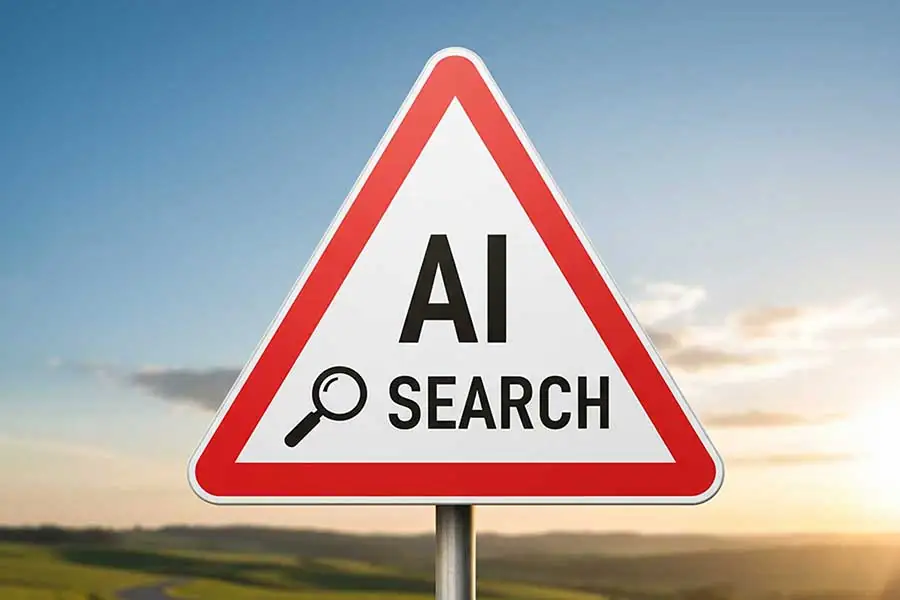5 Warning Signs Your Taiwan Marketing Agency Doesn’t Understand AI Search


Are you paying your Taiwan marketing company for AI marketing services every month? Is your manufacturing company showing up in AI search results?
Table of Contents
According to Forrester research, B2B buyers are adopting AI-powered search at three times the rate of consumers, with 90% of organizations now using generative AI in their purchasing process. While you focus on production quality and delivery timelines, your competitors are capturing the AI-driven buyers you’ll never even know existed.
The problem? Most Taiwan marketing agencies are faking AI expertise. Here’s how to spot them before they waste more of your money.
Warning Sign #1: They Can’t Show You Where You Appear in AI Search Results
Ask your agency this: “Show me where our company appears when someone asks ChatGPT about products like ours from Taiwan.”
If they can’t do this or promise to “look into it,” you’ve found your first red flag.
Recent data from G2 reveals that 50% of B2B buyers now start their buying journey in an AI chatbot instead of Google Search. When a procurement manager asks ChatGPT to help him find a supplier to meet their needs, your company name should appear in that answer. If it doesn’t, you’re invisible and you are losing business to your competitors every day.
Ask your marketing to test your visibility in ChatGPT, Claude, Perplexity, and Google’s AI Overview right now. These are free tools. If your agency hasn’t already tested them, or doesn’t know what they are, they’re not equipped for AI marketing.
Here’s what most agencies miss: AI search engines cite companies with detailed, human-written technical content. Not keyword-stuffed marketing fluff. Not AI-generated blog spam. Real technical documentation written by people who understand your processes. If your agency hasn’t prioritized this type of content, they fundamentally misunderstand what AI search requires.
Here’s what most agencies miss: AI search engines cite companies with content that is:
- Detailed, human-written technical content.
- Real technical documentation written by people who understand your processes.
They do not prioritize or cite:
- Keyword-stuffed marketing copy.
- AI-generated blog spam.
If your agency hasn’t prioritized this type of content, and does not have the people to create it, they fundamentally misunderstand what AI search requires.
Warning Sign #2: They’re Selling “AI Content Generation” as the Solution
Here’s the paradox: agencies claiming they’ll use AI to generate content that will rank in AI search.
This is backwards. AI-generated content is precisely what AI search engines are designed to look past. Research tracking AI visibility patterns shows that AI search engines preferentially cite content with clear human expertise signals, exactly what AI-generated content lacks.
Think about your CNC machining tolerances, your proprietary processes, your decades of problem-solving for automotive clients. This is what AI search engines want to cite. A content bot can’t manufacture this expertise.
While you’re publishing AI-written generic descriptions, your competitor is publishing detailed human-written explanations of their precision machining workflow, complete with tolerance specifications, quality control procedures, and real case studies. That is what AI search engines really want to cite.
Agencies pushing AI content generation are offering you generic content that will make you less visible, not more. Why? Because hundreds of your competitors are getting the same generic output from the same AI tools. What you need: human writers who interview your engineers and document your real processes. Yes, this costs more. So does running your factory with precision equipment instead of cheap knockoffs. Same principle.
- Agencies pushing AI content generation offer generic content that will make you less visible.
- This is because many competitors are getting the same generic output from the same AI tools.
- What you need: Human writers who interview your engineers and document your real, proprietary processes.
- This investment costs more, but it is necessary, like using precision equipment instead of cheap copies.
Warning Sign #3: They Focus on Traditional SEO Metrics, Not AI Citation Tracking
Does your agency’s monthly report show keyword rankings and backlinks but nothing about AI search visibility?
Those traditional metrics still matter, but they’re incomplete. It’s like measuring your company only by factory floor space while ignoring actual order volume. The fundamental shift: traditional SEO determined whether you appeared in search results. AI search determines whether you appear in the answer itself.
According to TrustRadius research, 72% of B2B buyers now encounter Google’s AI Overviews when searching, and 90% click through to cited sources. If your company isn’t being cited, you’re invisible to most active buyers. Bain research confirms that ChatGPT users are clicking links at more than twice the rate they were just months ago.
What should agencies track? AI search citation frequency across major platforms, and search visibility tested regularly. Request a supplementary report showing your AI search visibility compared to competitors.
What should agencies track?
- AI search citation frequency across major platforms.
- AI Search visibility tested regularly.
Warning Sign #4: They Can’t Explain Their Content Structure Strategy
Ask your agency: “How are you structuring our content so AI search engines understand our expertise?”
Expect blank stares. Most agencies think about isolated “blog posts” and “service pages.” But AI search engines need to understand relationships between your expertise areas. Just as your ERP system needs structured data, AI engines need structured content to cite your expertise.
AI platforms don’t cite shallow content. Research from 10Fold Communications found that AI platforms like ChatGPT now account for 34% of qualified leads, but only when companies have comprehensive, well-structured content.
Your competitor has a 2,500-word page explaining their powder coating process with preparation methods, application techniques, curing parameters, and real case studies. You have 300 words saying “We offer powder coating services.” When buyers ask ChatGPT about powder coating aluminum parts, guess who gets cited? This content can only come from human experts. Our guide on mastering website structure explains why this foundation matters.
Warning Sign #5: They Promise Quick Results or Guaranteed Rankings
If anyone promises “first page AI search rankings in 30 days” or “guaranteed ChatGPT citations,” you’re being scammed.
This is why:
Building AI search visibility takes time. AI systems need to crawl and understand substantial content. They evaluate authority signals over time. Legitimate improvement typically takes 3-6 months of consistent, human-written content publication.
You wouldn’t believe a supplier promising to cut production costs 60% in one month without consequences. The same skepticism applies here. What’s realistic? Month one establishes baseline measurements. Months two through four involve creating substantial technical content. Months five through six show early citations emerging. Sustained improvement comes months seven through twelve.
- Month one establishes baseline measurements.
- Months two through four involve creating substantial technical content.
- Months five through six show early citations emerging.
- Sustained improvement comes months seven through twelve.
Reputable agencies, like experienced providers who understand AI marketing for manufacturers will give you a roadmap, explain the human effort required, and set realistic expectations. They’ll emphasize investment in human expertise to create genuinely authoritative content, not promise magical overnight results.
Why This Matters More Than You Think
While you’re reading this, your competitors are investing in genuine AI search optimization. Forrester predicts that by the end of 2025, AI-generated traffic will represent 20% or more of total organic traffic for B2B companies.
The buyers who’ll never find you won’t call to complain. They’ll simply buy from whoever AI systems recommend. Every month you work with an unqualified agency is another month your competitors build AI search authority while you don’t. The good news? If you start now with the right approach (human-written technical content demonstrating genuine expertise) you can still capture this shift. But the window is narrowing.
What to Do Next
Week 1: Test your AI visibility yourself. Open ChatGPT and ask industry-specific questions. See if you appear. Try Claude, Perplexity, and Google’s AI overviews. Take screenshots.
Week 2: Ask your agency the questions from this article. Can you show me where we appear in AI search? What technical content have you created? How do you measure our AI citations? Record their responses.
Week 3: Request an AI visibility audit showing current citations, competitor comparison, content gaps, and a plan for the future. If they can’t provide this, you have your answer.
Week 4: Make a decision. Either your current agency commits to genuine AI optimization with human-written technical content as the foundation, or you find partners who specialize in this. As explained in our guide on questions to ask marketing company salespeople, you need genuine expertise, not rebranded services.


Doing AI Optimization the Right Way
AI search optimization isn’t about tricks or automation. It’s about investing in human expertise to document your company’s genuine knowledge. That’s what AI systems cite. Your manufacturing company has decades of technical expertise. Your engineers solve complex problems daily. This knowledge is exactly what AI search systems want to cite, but only if it’s properly documented in comprehensive, human-written content.
At GlobalSense, we’ve built our entire approach around what AI search engines actually reward: native-speaker writers who create original, in-depth technical content. Our foreign-led team combines decades of industrial B2B expertise with a content-first methodology specifically designed for Taiwan and Southeast Asian manufacturers expanding internationally. We interview your engineers, document your actual processes, and create the comprehensive technical depth that AI platforms cite, because we understand that AI systems don’t cite shallow marketing copy, they cite genuine expertise properly documented.
This is why we never work with competing clients and why our multilingual team focuses on creating unique, human-authored content rather than templated solutions. We communicate in board-level business terms because our clients are executives making strategic decisions, not technical implementers. And we measure what matters: inquiries, ROI, and sustained visibility in both traditional search and emerging AI platforms.
The question isn’t whether Taiwan manufacturers can compete in AI search. With genuine technical expertise, you have a massive advantage if you document it properly. The question is whether your current agency understands the fundamental difference between old SEO tactics and what AI search engines actually cite, or whether they’re repackaging 2020 strategies with “AI-powered” labels.
